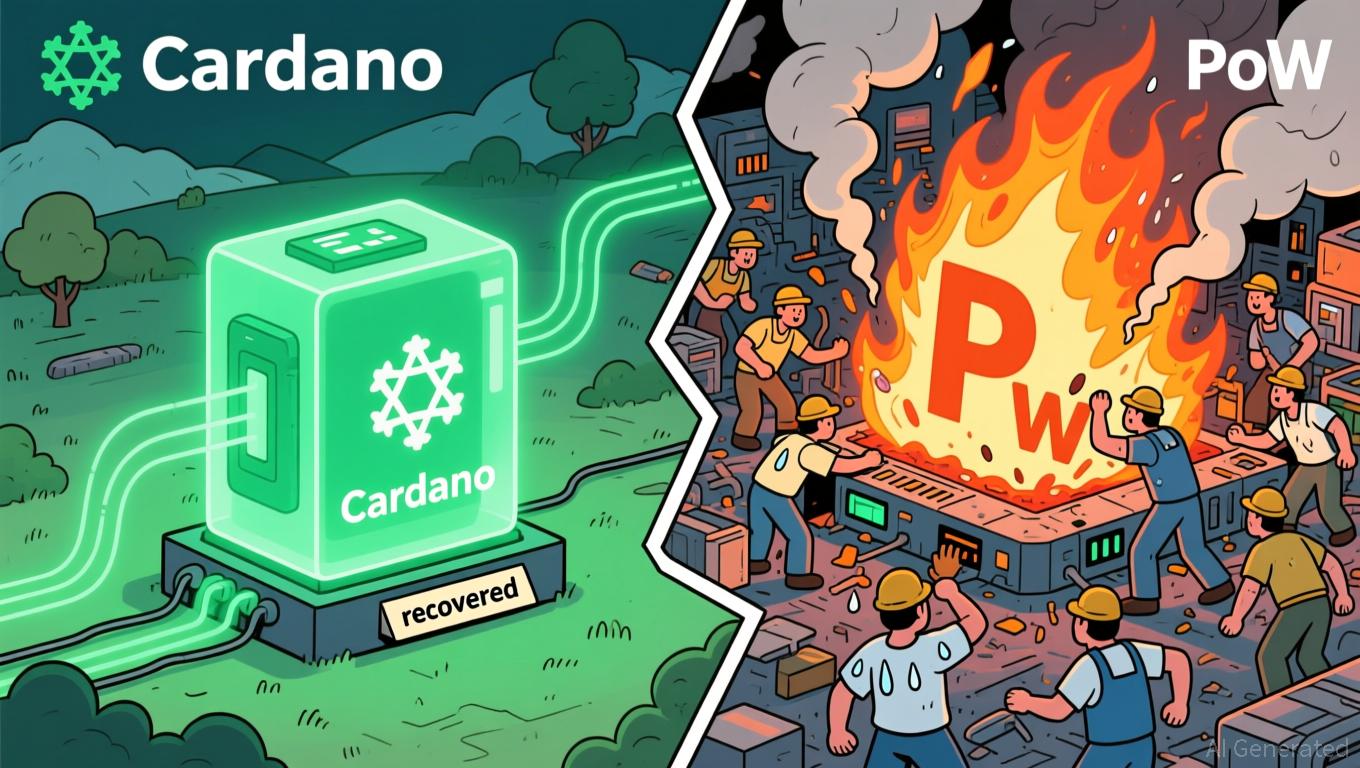Cardano News Today: Blockchain Dispute: Should Those Responsible for Chain Splits Face Legal Action or Should Open-Source Creativity Be Safeguarded?
- Solana co-founder Anatoly Yakovenko praised Cardano's swift recovery from a November 2025 chain split, calling its resilience "pretty cool" despite a malicious transaction exploiting a deserialization bug. - Cardano's Ouroboros consensus model enabled rapid convergence without hard forks, preserving transaction throughput and avoiding fund losses through emergency node upgrades. - A public debate emerged between Yakovenko and Cardano founder Charles Hoskinson over legal accountability, with Hoskinson adv
Cardano's network architecture has received public recognition from Solana Co-Founder Anatoly Yakovenko, who applauded its robust design after the blockchain quickly bounced back from a recent chain split. Yakovenko described the blockchain's durability as "pretty cool" and pointed out the complexities involved in developing a Nakamoto-style consensus protocol without relying on proof-of-work.

The chain split also ignited a public discussion between Hoskinson and Yakovenko about whether the event should be handled as a criminal case. Hoskinson maintained that the attack—carried out by a dissatisfied stake pool operator (SPO) who exploited testnet weaknesses—deserved legal consequences, claiming it inflicted "catastrophic harm" on the ecosystem
Cardano's effective management of the situation has strengthened its standing as a resilient PoS blockchain. Observers pointed out that the fork demonstrated the network's capacity to self-heal without stopping operations, which is rare in the cryptocurrency sector
Yakovenko's commendation reflects increasing mutual respect among blockchain leaders, but the incident also underscores persistent challenges in protecting PoS networks from targeted attacks. The ongoing debate about legal responsibility raises important questions about how to balance network resilience with regulatory measures in decentralized systems
Disclaimer: The content of this article solely reflects the author's opinion and does not represent the platform in any capacity. This article is not intended to serve as a reference for making investment decisions.
You may also like
Gelatin Snacks Gain Popularity, Yet Specialists Warn: Not an Instant Solution
- Burn Blend released a gelatin-based snack protocol with three formulations targeting weight management and metabolic health, following a 340% surge in "Gelatin Trick Recipe" searches and 50M+ social media views. - Morning, afternoon, and evening recipes combine ingredients like berberine, chromium, and herbal teas to address thermogenesis, blood sugar control, and recovery, requiring precise preparation steps. - The company emphasizes the protocol as a dietary supplement tool, not a standalone solution,

Malicious Software Abuses npm Preinstall to Steal Sensitive Data, Compromising 25,000 GitHub Repositories
- Wiz Research identified Shai-Hulud 2.0, a supply-chain attack exploiting npm's `preinstall` phase to hijack 25,000+ GitHub repos and steal secrets from crypto/developer tools. - Malware infiltrates packages like `@zapier/zapier-sdk` and `@ensdomains/ens-validation`, using GitHub runners for credential theft and workflow injection across ecosystems. - Attackers create self-hosted runners, exfiltrate secrets as artifacts, and delete traces, with new compromises emerging at 1,000 per 30 minutes. - Security
Connecting Conventional Finance with Cryptocurrency: Revealing Korea’s Leading Fintech Force
- South Korea's Upbit and Naver Financial will merge to create a fintech-crypto powerhouse, aiming for a Nasdaq IPO by 2026. - The stock-swap deal grants Dunamu shareholders 30% of the combined entity, while Naver's stake drops to 17% to address antitrust concerns. - Regulators are scrutinizing the merger, with Dunamu transferring over half its voting rights to Naver to balance control and compliance. - The post-merger entity's valuation rose to KRW 50 trillion ($34.5B), reflecting confidence in growth and

The ChainOpera AI Token Crash: An Alert for Cryptocurrency Initiatives Powered by AI
- ChainOpera AI token's 96% collapse in late 2025 exposed systemic risks in AI-driven crypto projects, highlighting governance, algorithmic, and regulatory flaws. - Centralized control by ten wallets and opaque AI models triggered liquidity crises and panic selling, undermining decentralization principles. - Regulatory ambiguity from the 2025 GENIUS and CLARITY Acts exacerbated instability, deterring institutional investment and amplifying market volatility. - Market sentiment shifted rapidly, with investo
